Beneath the swirling clouds punctuated by beams of sunlight, cows graze idly and crops sway in the breeze at Amy’s Farm in Ontario. Yet, across the road, concrete warehouses loom over these graceful fields.
The jarring sight of vibrant green farmland and the drab gray warehouses underscores the battle between industrialization and preservation in agricultural Ontario, exemplified by the corporate buyout of Amy’s Farm. While it is easy to turn a blind eye to corporate greed, with the threat of industrialization encroaching upon several social and cultural fixtures in our community, we should be furious.
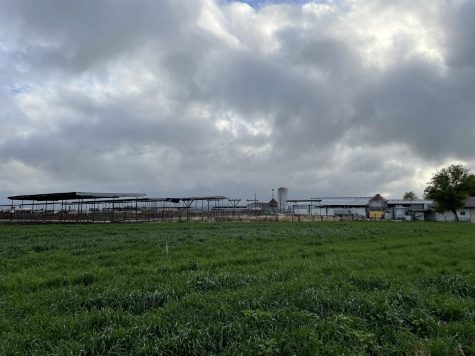
In 1988, Randy Bekendam founded his cattle farm in the rich valley of Ontario, California. Because of the unsustainability of the local dairy industry, the farm declared bankruptcy in 1997 — less than ten years after its opening. Randy and his family faced a major dilemma: either give up the farm or employ more sustainable farming practices.
Shortly after, in 1998, Randy revitalized the farm, stepping in a new direction. Naming the farm after his daughter Amy, Farmer Randy and his family moved away from large-scale cattle farming to a more community-oriented approach, opening the farm’s gates to school field trips as a means of income.
Amy’s Farm began growing food in 2008, subsequently establishing their nonprofit organization, the Southern California Agricultural Land Foundation. The next year, the farm expanded its vision to providing produce to the local community, offering volunteer opportunities, and hosting field trips for young kids, solidifying itself as a demonstration regenerative farm.
As a kindergartener, my first experience with field trips was a day-long excursion to Amy’s Farm. I hold my visit to Amy’s Farm nearly twelve years ago very near and dear to my heart. I got to milk a cow at five years old! What more could you ask for?
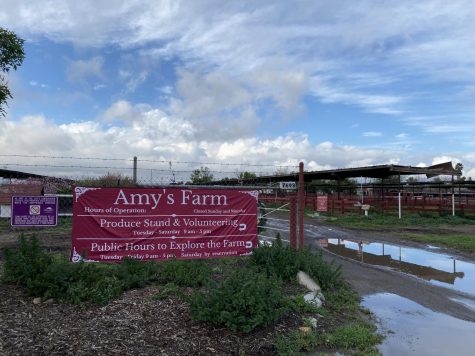
Day and night, the trucks rumble through the streets, a reflection of the city’s transformation into a bustling hub of the global supply chain, fueled by the boom of online shopping. But behind the new warehouses and promises of job growth, there’s a darker story of exploitation, environmental degradation, and displacement that frustrates Ontario residents.
Exploitation is central to the warehouse industry. Within the warehouses, workers labor under oppressive conditions, with frequent injuries and wages that cannot keep pace with the rising cost of living in the region. Outside of the warehouses, the land that once provided life and support to the people of Ontario is engulfed by the industrial zone, displacing families, emitting exorbitant amounts of greenhouse gases, and polluting the air.
As over six hundred warehouses are crammed into Ontario’s 50 square-mile industrial zone — including Amazon’s largest warehouse in the world, spanning 4.1 million square-feet — the people of Ontario are forced to grapple with the harsh reality of capitalism, an insatiable beast bulldozing through the bedrock of their community.
Amy’s Farm is in danger.
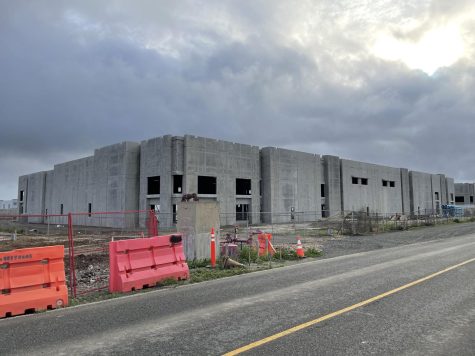
Visiting Amy’s Farm today is surreal. During our drive through Ontario, we witnessed the stark contrast of the area — the construction of new warehouses on the land of local farms — firsthand.
“There is a warehouse fever,” Farmer Randy said. “And the primary reason for that is what you’re holding in your hand, [your phone]. The whole world shops online now, and that was really exacerbated by COVID. Because of that demand, the warehouses are proliferating, and they’re large.”
Amy’s Farm does everything right: it is a sustainably run, prominent fixture in the local community working toward a zero-waste model. Well, everything but one thing — they don’t own the land they operate on. As renters, the farm could not control what happened to their land after new zoning laws were passed.
The farm’s landlord sold the ten-acre plot of land for one million dollars an acre, and Amy’s Farm now sits on land in escrow with a warehouse developer. A devastating — yet expected — loss for the community, the future of Amy’s Farm now hangs in limbo.
As their land is sold right from under them, Farmer Randy and his family are set to be evicted on August 31st. A stronghold of service and culture in the surrounding community, Amy’s Farm will cease to exist in Ontario in a matter of months.
“We’ve had over two million visitors in the last twenty-five years,” Farmer Randy said. “Nobody wants to see Amy’s Farm go. But we’re simply farmers. We’re a farm family. We’re happy to continue our work, but we do not have the capacity to purchase the land.”
Like many other farms in the area, Amy’s Farm has protested Ontario’s new industrial zoning laws for years. A year ago, the farm participated in a coalition against the construction of warehouses across the street. Though the coalition’s efforts did not substantially change zoning laws, the movement gained considerable traction with the public.
“[The corporations’] master plan is not going to go uncontested,” Farmer Randy said. “[The negative press] has been a wakeup call for them, which is good. We are still lobbying politicians and advocating for farmland conservation. Will that save these particular ten acres? I mean, who knows? It would have to happen pretty quickly.”
Although Amy’s Farm faces a grim situation, Farmer Randy has expressed his continued hesitance to give up on the farm.
“I mean, yesterday we planted eighteen fruit trees,” Farmer Randy said. “We won’t get fruit from them for three years, but we’re getting evicted in a few months. So, it’s an act of faith that some convergence of circumstances — some pathway to stay here will materialize. I hate to see gaps, I hate to see waste, so we planted trees even though we may have to walk away from them. We keep the mindset that we’re going to stay forever, and we work toward that.”
Following their projected closure to the public in late June, Amy’s Farm plans to continue their support for local urban farming with Lopez Urban Farm, which makes up a three-acre plot in Pomona. Even as the farm’s sustainable practices and volunteer opportunities will continue in other urban settings, Randy still fears the impact of these warehouses on our local environment.
“It’s not an attractive world we’re building,” Farmer Randy said. “You have all the pollution in the warehouses and the loss of the farm — the loss of quality of life. But they make them pretty, right? The landscaping is beautiful — they’ll do edible landscaping. They’ll put solar on the roof. They’ll have electric vehicles in-house. The’ll do all these ‘green mitigations,’ but it doesn’t outweigh the damage they’re doing.”
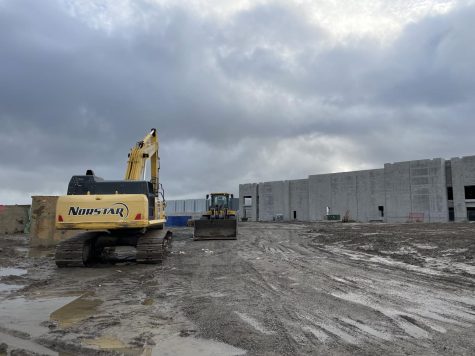
During the beginning of the pandemic, John Choi, Director of Equity, felt helpless. He and his family turned to volunteering at Amy’s Farm to get away from their home.
“[Amy’s Farm] is like an oasis,” said Mr. Choi. “I think it is a place for people to sort of retreat to and get away from the pollution [of the outside world].”
A pillar of generosity in the community, a closure at Amy’s Farm’s would halt their service to [the community]. The farm’s produce store never sells out, and what remains is donated to local food banks. Food is what makes Amy’s Farm truly essential.
“When COVID hit, did you take note how overnight, without any argument, every single living being on the planet knew what was essential and non-essential?” Farmer Randy said. “Remember that distinction? Every non-essential whatever had to shut down. Every essential whatever could keep operating. We got to stay open because we’re essential.”
Amy’s Farm is a truly indispensable piece of Ontario as well as surrounding cities, and we all know that. Yet, although we may know it, corporate industrialists continue to feign ignorance of its importance in order to continue raking in heaps of money.
“There’s important work being done [at Amy’s Farm], specifically farming, agriculture, the plants and animals,” said Zac Wang (’23), a student who volunteered for the farm for this year’s Dies Mulieres & Men in the Arena day of service. “That’s cultivating life and that’s just as important as anything else.”
Amy’s Farm is undoubtedly an integral piece of the community, and its imminent loss will be tragic. And we should be furious watching this happen. Standing together against corporate industrialization is our only option in preventing its proliferation.
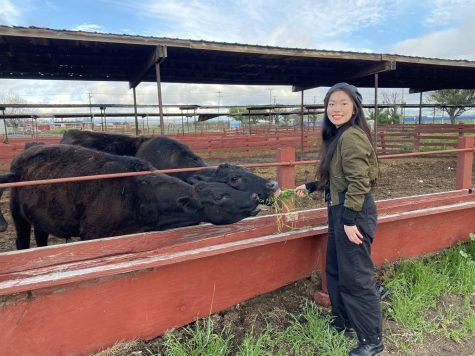
As corporate industrialization invades Ontario, destroying farmland and displacing communities, we must remain vigilant in questioning the underlying power structures present in the city — and in our everyday lives. We must keep asking: Who owns the land? Who has the authority? Why, really, is this happening? Who has the power to turn this around?
Against the deeply cruel and unsustainable process of corporate industrialization, our most powerful weapon is the people. It takes all of us to fight for our community in the belly of the capitalist beast.
“It takes a vision, you know,” Farmer Randy said. “Most people — just the general public — don’t have a clue what regenerative farming is, or carbon sequestration. Because who is really talking about it? It’s not mainstream. I mean, if the public just got together and said ‘enough, we don’t want any more warehouses,’ then [saving Amy’s Farm] is doable, but that would take a pretty big grassroots movement.”


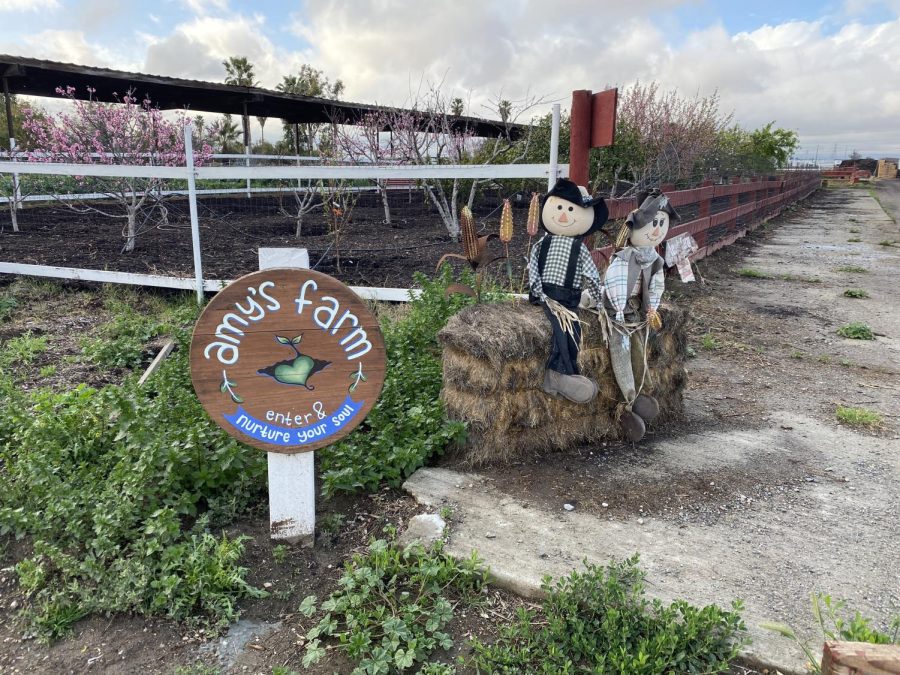



![Many Webb students spend their free time in the library watching a popular TV show like Riverdale and Euphoria. “Based off what I’ve seen, like in Euphoria, because the actors are older, they don't showcase an actual high school life properly,” Sochika Ndibe (‘26) said. “Since [the actors] are older [and] playing a teenager, from a girl’s perspective, it is going to make you think you should look more developed at a young age.” The actor, who plays Veronica Lodge, was 22 years old at the time of filming.](https://webbcanyonchronicle.com/wp-content/uploads/2025/03/Antecol-Media-affects-how-society-functions-graphic-1200x900.png)









